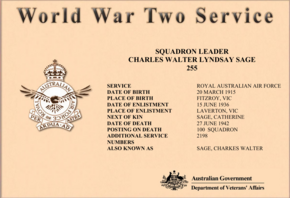
SAGE, Charles Walter Lyndsay
| Service Number: | 255 |
|---|---|
| Enlisted: | 15 June 1936 |
| Last Rank: | Squadron Leader |
| Last Unit: | No. 100 Squadron (RAAF) |
| Born: | Fitzroy, Victoria, Australia, 20 March 1915 |
| Home Town: | Brighton, Bayside, Victoria |
| Schooling: | Not yet discovered |
| Occupation: | Student |
| Died: | Flying Battle, At sea , 27 June 1942, aged 27 years |
| Cemetery: |
Lae War Cemetery (CWGC) Grave Reference, Location ~ Plot NN. Row C. Collective Grave 1 - 3. Personal Inscription ~ "FATHER OF CHARLES AND MARK REST IN PEACE". |
| Memorials: | Australian War Memorial Roll of Honour, Mathoura War Memorial |
Non Warlike Service
| 15 Jun 1936: | Enlisted Royal Australian Air Force, Air Cadet, 255, RAAF Laverton |
|---|
World War 2 Service
| 3 Sep 1939: | Involvement Squadron Leader, 255 | |
|---|---|---|
| 10 May 1942: | Transferred Royal Australian Air Force, Squadron Leader, No. 100 Squadron (RAAF) |
Help us honour Charles Walter Lyndsay Sage's service by contributing information, stories, and images so that they can be preserved for future generations.
Add my storyBiography contributed by Stephen Bonald
Extract from Avaition Hertiage Museum ( attached link)
A9-52 is the first Australian Beaufort aircraft lost on an operation against the enemy.
On the night of 26 June 1942 Beaufort A9-52 was detailed along with other aircraft from the Squadron to carry out a bombing raid on Salamaua and the aircraft took off from Port Moresby. At approximately 0400 hours Squadron Leader Sage called Port Moresby and asked for a Direction Finding Bearing and was given a second class bearing of 319 degrees. At 0430 hours a further bearing of 288 degrees was given and searchlights were focussed over the aerodrome to assist the pilot. There were no further messages after 0430 hours. Radar equipment located all other aircraft returning from the raid at approximately 30 minutes flying time from the aerodrome, but A9-52 was not able to be found. From Direction Finding bearings that were given it was apparent the aircraft had returned from the raid and was south of the high range between Lae and Port Moresby. The moon had set by 0430 hours and low cloud made Port Moresby aerodrome difficult to locate. It was considered unlikely that the aircraft could have carried out a forced landing either on the beach or water after the moonset, and in unfavourable weather conditions. The wreck of the aircraft and the remains of the crew members were later found about 60 miles from Port Moresby.
The crew members of A9-52 were:
Sergeant Douglas Wallace Desmond (405839) (Wireless Air Gunner)
Flight Sergeant Charles Forbes Patterson (401048) (Wireless Air Gunner)
Squadron Leader Charles Walter Lyndsay Sage (255) (Pilot)
Flying Officer Joseph Anderson Wormald (402812) (Observer)









